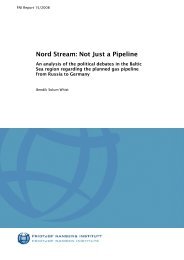SAIIA SOUTH AFRICAN DIPLOMATS ABROAD.pdf
SAIIA SOUTH AFRICAN DIPLOMATS ABROAD.pdf
SAIIA SOUTH AFRICAN DIPLOMATS ABROAD.pdf
Create successful ePaper yourself
Turn your PDF publications into a flip-book with our unique Google optimized e-Paper software.
On July 9th, 1884, weeks too late, Sir Hercules Robinson<br />
cabled once again:<br />
"Ministers request me to send message in the following<br />
terms: Begins: 'As parliament will soon be prorogued<br />
Ministers are anxiously awaiting information relative to<br />
negotiations with German Empire on question of West Coast,<br />
referred to in your telegram received on the 18thjune. Ministers<br />
advise me that feeling in Colony strongly in favour of retention<br />
of British authority over coastline from Orange River upwards,<br />
and that the rumours that British jurisdiction over Walwich 1<br />
Bay is to be abandoned has caused great uneasiness. Annexation<br />
of Damaraland to German Empire is to be greatly<br />
deprecated. Ends!"<br />
The man of Blood and Iron allowed no one to take liberties<br />
with him, as South Africa learnt too late.<br />
We in this country learnt that even general elections, no<br />
matter of what epoch-making local importance they may be,<br />
play a very minor part in international affairs and realised the<br />
need for men of suitable calibre to deal with external affairs.<br />
Sir Hercules Robinson knew enough to gauge the position but<br />
one is not so sure about all the members of the cabinet of that<br />
time or about the civil service. It was the first occasion on which<br />
we, as a very young country, were what the Americans call<br />
"outsmarted" in international affairs. It is interesting to note<br />
that the Americans are still very conscious that the quality of<br />
some, though by no means all, of their diplomats places them<br />
at a disadvantage, and this accounts for the acerbity and<br />
isolationist tone of some of the debates in Congress. The<br />
advantage of a country with a long diplomatic tradition in dealing<br />
with a newcomer is recognised as a very re^l thing, for both<br />
the mighty United States and a small country like South Africa.<br />
We had a further experience of this in more recent times when<br />
we discovered that a revised Mozambique Convention, negotiated<br />
soon after the First World War, had somehow been turned<br />
very much to our disadvantage and to the advantage of Portugal<br />
by the skill of her more experienced delegates.<br />
There is only one remedy—to continue to gather experience<br />
and to obtain for our Foreign Service the best men South Africa<br />
can offer.<br />
Founding of the Department of External Affairs<br />
THE first Colonial Conference (afterwards called the Imperial













